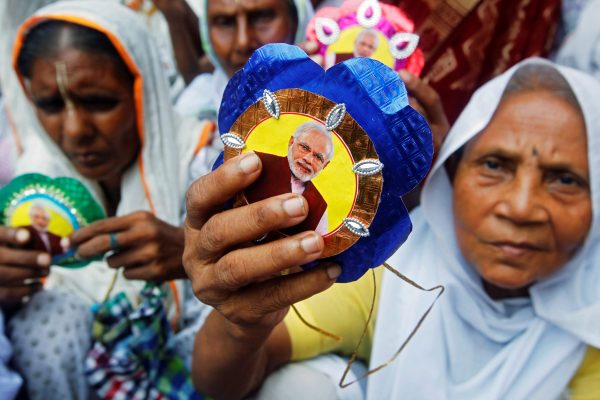Indira Gandhi sought to reassert control by refashioning herself as a populist, ‘going once more direct to the people’. She continued to centralise power, and in 1975 she suspended democracy itself.
India’s experience in the 1970s is hardly unique. Populism has been a recurrent, if not endemic, feature of democracy in Asia. Why?
Populists are the charismatic leaders of mass political movements. This means that supporters are mobilised less by clientelistic ties or by membership of aligned parties or civil society organisations than they are by a direct affinity for the leader. But populists are not mere independents. Rather, populists’ movements include dedicated followers over whom the leader has complete authority.
Populists in this sense thrive where large numbers of voters are effectively independent of more deeply institutionalised political parties. To explain when and where populists are successful requires an understanding of why regular parties are weak at different times and places.
Political parties have historically tended to take on one of two forms. The first is what political scientists often call the ‘modern programmatic party’. These are well-institutionalised parties that mobilise voters through organisations such as churches and labour unions. Britain’s Labour and Conservative parties are the classic examples, emerging out of the gradual processes of industrialisation and democratisation in the 19th century. By the second half of the 20th century, similar parties had come to dominate almost every political system in the West.
In places like India, political parties are of a second type: the ‘clientelistic party’. These parties mobilise supporters through the private exchange of goods and services for votes. They have shallow social roots and instead build up their networks by incorporating brokers — rural bigwigs and slum bosses — along with their clients. This approach remains the modus operandi of most Indian political parties and of parties across much of the developing world. As my research shows, almost all instances of successful populist mobilisation have occurred in clientelistic party systems like that of India.
Clientelistic democracies are much more vulnerable to populist appeals than are programmatic ones. The typical voter in a clientelistic democracy may be loyal to the local party broker who provides her with cash, a civil service job or some other favour. But she has little reason to be loyal to the party itself. Voting is essentially a business transaction between voters, brokers and party leaderships.
Election outcomes in clientelistic democracies are consequently highly contingent on the collective behaviour of the broker class of urban bosses and rural elites. Those few cases of enduring national clientelistic party domination such as that of Japan’s Liberal Democratic Party are characterised by the tight control of the central party leadership over the allocation of patronage to these local political fixers.
In contrast, in countries like India where brokers have independent access to power and resources, parties are often highly fragmented and weak. Under Congress’s weakened central leadership in the mid-1960s, local bosses left the party (and took their supporters with them), which led to a series of state-level election defeats for the party in 1967 and then to the party’s break up in 1969. Unable to impose any unity on the conservative local bosses both inside and outside of her own party, Indira Gandhi turned to populism, marking a shift towards a new personality-driven politics. In campaigns around the country she promised to ‘get rid of poverty’ in response to her opponents’ narrow-minded campaign to ‘get rid of Indira’.
40 years later, although on the other side of the political spectrum, Narendra Modi rode to power by similarly appealing directly to independent voters who were no longer deeply embedded in national party-patronage networks. Modi’s charismatic appeal won the day. As one recent study concludes, the Bharatiya Janata Party (BJP) ‘victory was secured by a well-planned presidential style campaign around Modi himself’. Another study showed that one in every four respondents who voted for the BJP-led alliance said that they would not have voted for the coalition if Modi had not been the prime ministerial candidate.
Nor is India unique. Across democratic Asia and Latin America, where clientelism has been endemic, populists have thrived. For example, parties in the Philippines are so weak that nine in 10 Filipinos identify with none at all, while politicians elected on an opposition ticket will happily switch sides after an election and bring their supporters with them. It is in this context that populists like Rodrigo Duterte can appeal through mass rallies, mass communication and social media directly to independent voters over the heads of such political intermediaries. Duterte was following a long tradition of populism in the Philippines, going back not just to Joseph ‘Erap’ Estrada in the late 1990s but also in inchoate form to Ramon Magsaysay in the 1950s.
Given the continued weakness of parties in much of democratic Asia, populism is unlikely to lose its appeal in the region any time soon.
Paul D Kenny is Fellow and Head of the Department of Political & Social Change at the Australian National University. He is author of Populism and Patronage: Why Populists Win Elections in India, Asia, and Beyond (Oxford University Press, 2017), and Populism in Southeast Asia (Cambridge University Press, forthcoming).

